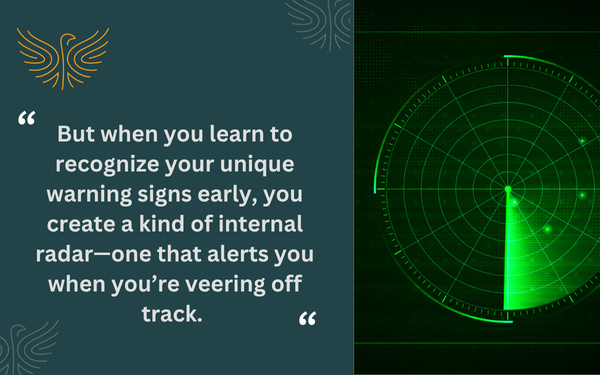Relapse is a common part of the recovery journey, and experiencing a setback doesn’t erase the strength or progress you’ve built along the way. In fact, research shows that up to 85% of people in recovery experience at least one relapse in the first year.
Far from being an exception, it’s often a shared experience—a signal that deeper healing and adjustment are still unfolding.
But when you learn to recognize your unique warning signs early, you create a kind of internal radar—one that alerts you when you’re veering off track. This awareness gives you the power to pause, reflect, and make small adjustments before old patterns return. In recovery, this self-awareness isn’t just prevention—it’s progress. Every moment you notice and respond differently is proof that your healing is still active and alive.

So, how can you better identify your unique relapse warning signs? Below, we take a closer look.
_______________________________________________________
Why Does Relapse Happen?
Relapse isn’t about weakness, moral failing, or lack of willpower—it’s a complex interaction between your biology, psychology, and environment. Long-term substance use fundamentally rewires the brain’s reward system, creating neural pathways that don’t simply disappear when you stop using. These changes affect how your brain processes stress, manages emotions, and seeks comfort during difficult times.
Recovery professionals recognize relapse as a gradual process with three distinct phases:
- Emotional Relapse: This is where you’re not actively thinking about using, but your emotional state and self-care habits begin to deteriorate. You might isolate yourself, suppress difficult feelings, or neglect basic wellness routines.
- Mental Relapse: This stage is characterized by an internal war between the part of you committed to recovery and the part entertaining thoughts of using. You might experience intense cravings, start rationalizing why just once would be okay, or find yourself planning how you could use without anyone knowing.
- Physical Relapse: Finally, physical relapse is the actual return to substance use or addictive behavior.
The important insight here is that relapse begins long before the act of using—often manifesting as subtle emotional or behavioral shifts weeks or even months earlier. Thus, recognizing these early signals is key to preventing a full relapse and maintaining the recovery you’ve worked so hard to achieve.
_______________________________________________________
Common Relapse Warning Signs
While everyone’s warning signs are unique, certain patterns appear frequently across different recovery journeys.
You may notice:
- Increased irritability or snapping at loved ones over small issues
- Rising anxiety, restlessness, or tension without clear cause
- Feelings of hopelessness, numbness, or loss of motivation
- Romanticizing past substance use (“It wasn’t that bad” or “I was more fun then”)
- Emotional detachment from your support network or spiritual grounding
- Skipping therapy sessions or support group meetings
- Neglecting self-care (poor sleep, irregular eating, or hygiene decline)
- Withdrawing from accountability partners or avoiding honest conversations
- Engaging in impulsive or escapist behaviors like gambling, shopping, or risky sex
- Using “harmless” distractions (like screens, work, or social media) to avoid emotions
- Reconnecting with people or environments tied to past substance use
- Revisiting bars, neighborhoods, or social settings associated with old habits
- Facing major stressors such as grief, job loss, or relationship conflict
- Experiencing positive changes (promotions, new relationships) that disrupt stability
- Growing overconfidence (“I’ve got this handled” or “I don’t need meetings anymore”)
The earlier you notice these patterns, the more effectively you can course-correct and strengthen your recovery foundation.
_______________________________________________________
How to Identify Your Unique Warning Signs
Discovering your personal warning signs requires intentional reflection and observation.
Start by reviewing past relapses or close calls. What emotions surfaced first? What situations preceded the crisis? Were there physical sensations, recurring thoughts, or behavioral changes that appeared days or weeks before? Write these observations down.
Begin tracking your daily patterns through journaling or mood logs. Note your emotional state, stress levels, sleep quality, and any cravings or troubling thoughts. Over time, patterns will emerge—perhaps cravings intensify when you're overtired, or negative self-talk increases after family conflicts.
Also, don’t hesitate to invite feedback from trusted sources. Loved ones, sponsors, or therapists often notice subtle shifts in your mood or behavior before you do. Ask them to share observations compassionately but honestly. Their outside perspective can illuminate blind spots in your self-awareness.
Pay attention to early drift—those moments when healthy routines begin to fade. Maybe you’re meditating less frequently, arriving late to meetings, or finding excuses to avoid phone calls with your sponsor. These small departures from recovery practices often precede larger problems.
Create your personal warning list, documenting specific signs, triggers, and emotional cues. Review this list weekly, treating it as a living document that evolves as your self-knowledge grows.
And keep in mind that this process takes patience and self-compassion—you're learning to read your own internal weather patterns, and this skill only develops with time and practice.
_______________________________________________________
Responding to Early Warning Signs
When early warning signs appear, your response in those moments can change the course of your recovery.
Start by pausing to notice what’s happening—without guilt or panic. These signs aren’t proof of failure; they’re information guiding you toward what needs attention. You might remind yourself, “I’m noticing these signals, and that awareness itself is recovery in action.”
Reach out for support as soon as possible. Isolation fuels relapse, while connection restores clarity and accountability. Contact your therapist, sponsor, or a trusted peer who understands recovery. Sometimes just sending a short message like “I’m having a hard day” is enough to interrupt the silence and bring perspective.
Next, return to the fundamentals that stabilize you. Revisit your self-care routines, attend a meeting, or schedule a therapy session if you’ve drifted from your usual structure. Even small actions—getting enough rest, eating regularly, moving your body—help reestablish balance and confidence.
If distress feels intense, use grounding practices to steady yourself. Deep breathing, mindfulness, prayer, or journaling can help you process emotions safely. Physical movement, whether walking or working out, releases tension and healthily redirects energy.
To stay prepared for future challenges, create a personalized relapse prevention plan. Write down your early warning signs, primary triggers, and the coping strategies that help you most. Include key contacts and grounding techniques you can use when stress rises. Collaborate with your therapist or sponsor to refine this plan, and keep it somewhere easy to access—such as on your phone, in your journal, or on your bedside table.
And ensure you revisit your plan regularly. As your recovery evolves, your needs and strengths will shift too. Updating your strategies keeps them realistic and effective.
_______________________________________________________
Closing Thoughts
Knowing your personal warning signs helps you stay ahead of relapse. After all, recovery is an ongoing learning process, not necessarily a destination. Each day you practice awareness, each time you recognize a warning sign and respond wisely, you’re building the foundations for lasting sobriety.
Still struggling? The Freedom Recovery Centers (FRC) team is here to help you every step of the way, whether it’s your first or last time in rehab. Call us today at 804-635-3746.
.svg)






.svg)

.svg)



.svg)
